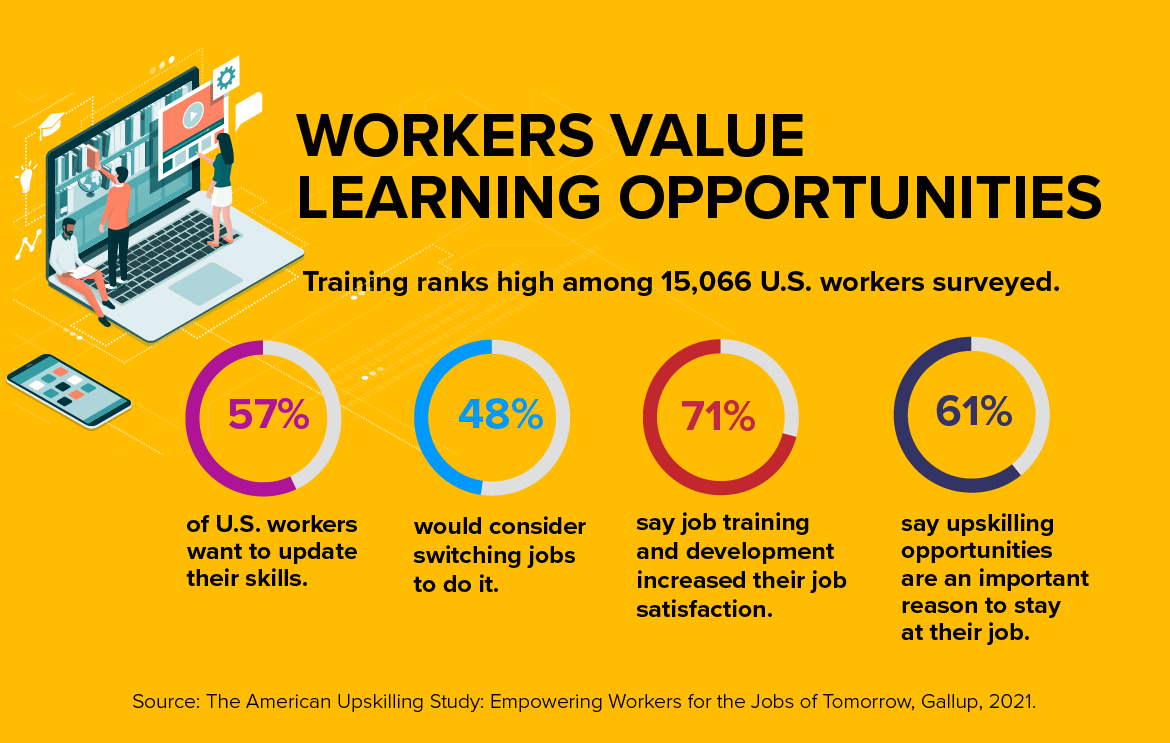From informal mentorship to conferences, chances are you’ve experienced some form of professional development during your career.
We know that professional development is in high demand. 71% of U.S. workers say training and development have increased their job satisfaction, while 61% say the opportunity to upskill is an important reason to stay at their job.
But is professional development part of the infrastructure of your K-12 school? Read on to learn why it should be.
What is professional development?
Put simply, professional development at school can be any type of continuing education for teachers, formal or informal. It can take place at the district-level, the school-level, or on an individual basis, based on the resources and organizational capacity you have available.
Professional development for K-12 teachers can take many forms. Formal professional development might mean the school sponsors conferences, courses, or workshops for teachers, while informal professional development can include anything from peer learning initiatives to streamlined communication between new and veteran teachers.

Why is professional development important for K-12 teachers?
Professional development, sometimes also called Learning & Development (L&D), may be the key to retaining employees.
According to Gallup research analyzed by SHRM, L&D gives workers a goal to work towards and a motivating factor to stay in their jobs.

Graphic from SHRM
Plus, the 2022 LinkedIn Global Talent Trends Report found that employees view professional development as the top way to improve company culture — in this case, the culture of your school.
It’s natural that at schools with tight budgets, L&D is often one of the first items on the chopping block. But when school administrators neglect opportunities for professional development, it can have long-term consequences.
At a time when K-12 teachers are leaving the profession in high numbers and those that stay are facing unprecedented challenges to their workloads and mental health, professional development opportunities may help new teachers stay in their jobs longer — while increasing the likelihood that all staff stay engaged.
Of course, teachers are famous for knowing the value of education! It’s up to administrators to connect them with, and make time for, opportunities that can continuously improve their skill set.
In order to boost student outcomes, empower educators to keep up with the latest educational methodologies, learn new classroom management techniques for students with behavioral challenges, and upskill for new expectations, like environmental education. Where budget is an issue, focus on L&D initiatives with a low barrier to entry, like free courses and teacher-organized presentations.
What kind of skills can professional development bring?
Professional development is a boon to schools not just because it helps retain teachers, but because it helps to motivate them. Regular professional development can help educators at your school:
Become more adaptable and innovative. Professional development opportunities can help teachers create a better classroom environment and learning experience while they learn new ways to handle road bumps in the classroom.
Gain confidence. Teachers are encouraged to build their skill set by applying new knowledge and best practices, backed by the experience of other educators, to challenging situations that may otherwise impact morale.
Communicate better. Teachers benefit from knowing that the school is investing in their growth, which creates stronger channels of communication between administrators and staff.
Pursue leadership opportunities. Educators are empowered to better themselves for students, peers, and administrators and to take advantage of new opportunities as they come. Ideally, this keeps them in the education field for the long run and enables them to be more effective at what they do.
Professional development options for K-12 teachers
Have you considered these ways to offer your teachers professional development?
Connect them with a continuing education course.
Sponsor teachers by blocking off time and offering incentives for them to complete courses.
- The American Psychological Association (APA) provides free online courses that offer continuing education (CE) credits, and which have been reviewed and approved by APA’s Office of Continuing Education in Psychology.
- Alison also offers free, self-paced, and online courses for educators on topics like classroom management and educational psychology.
- FutureLearn is a paid portal that connects educators with online courses with experts from international universities, like “Interdisciplinary Learning” from the University of Leeds and “Teaching Students Who Have Suffered Complex Trauma” from the Queensland University of Technology.
Send them to a conference for educators.
- Explore year-round conferences like LitCon, SXSW EDU, NAFSA, and Get Your Teach On, in different parts of the country at We Are Teachers.
Start a teacher-to-teacher mentorship program.
- Match tenured teachers with those just starting out to encourage exchange and learning.
- Let new teachers observe other teachers in the classroom.
- Organize teacher workshops where career teachers can share their learnings and new teachers can share new perspectives.
Start discussing professional development during department meetings and take your teachers’ feedback on what forms will benefit them most.
You can even consider a school-wide professional development day to give teachers an opportunity to take advantage without other work getting in the way.
Next steps
Thanks for reading! Learn more about partnering with Teachers On Demand to fill your educator vacancies.
